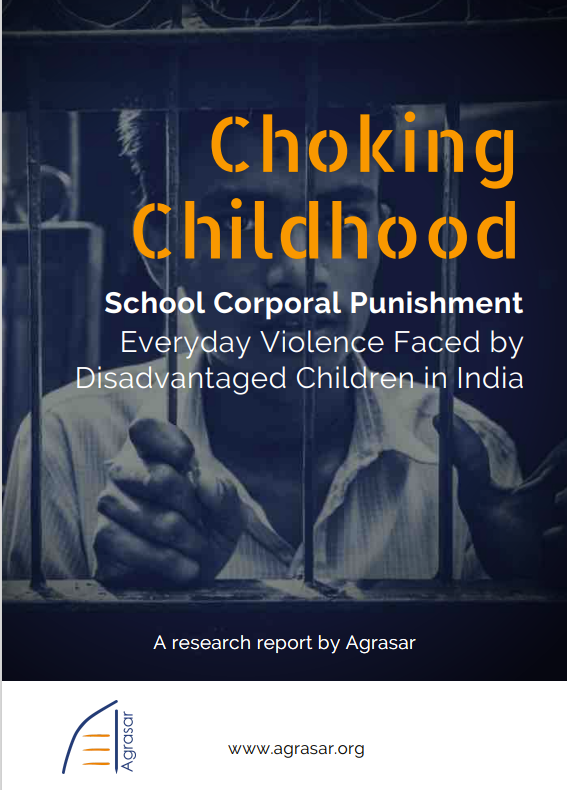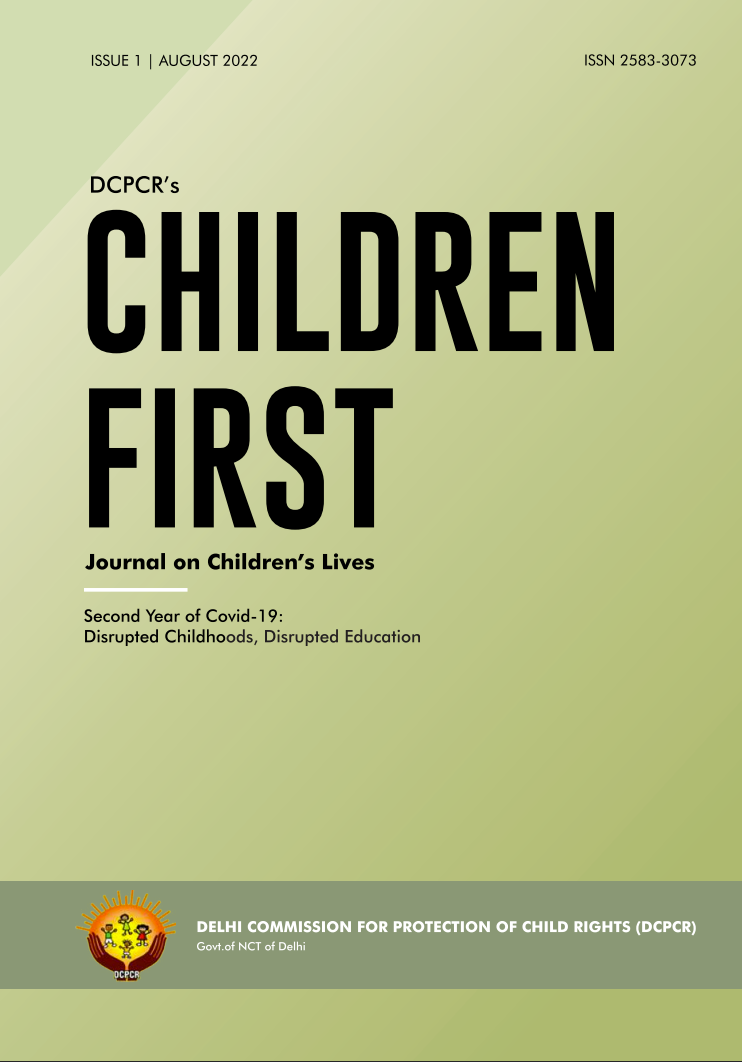Helpline To Eliminate Corporal Punishment In India
1800 121212 0
Everyday violence faced by almost all children in general and disadvantaged children in particular is an untraced global pandemic. Also, it is one of the root causes of violence that exists in today’s world. Even though legally banned in India, situation of Corporal Punishment in schools as well as homes is worrisome. We are pioneering the efforts of deeply understanding and eliminating corporal punishment in India in a systemic manner, anchored on child participation. We, as an India based NGO, work on behavioural, structural as well as cultural shifts through working with all stakeholders – children, teachers, parents, government and the society at large.
Research on Corporal Punishment in India | Agrasar, 2018
We undertook research on corporal punishment in India titled “Choking Childhood” to understand the problem and leverages of change. The study came up with following Findings:
1. 88% children in a large proportion of government schools are beaten up on a daily basis. (Note – In cities like Gurugram, children of migrant workers comprise more than 90% of students in the Government Schools.)
2. Existing legal provisions are not able to stop corporal punishment. Physical punishment and mental harassment of students by their teachers has been outlawed in India by at least fifteen legal and regulatory policies, notably the UN Child Rights Convention, of which India is a signatory since 1992, and the Right of Children to Free and Compulsory Education (RTE) Act 2009.
3. Following risk factors put marginalised children at a higher risk: a.) Low income leads to lack of means to attend school with punctuality and discipline, b.) Social prejudices against migrant communities lead to lack of empathy and respect, c.) Teachers and children have emotional and cultural disconnect among them
Our Response to eliminate Corporal Punishment in India
1. Enhancing agency among children
While the society as a whole bear the responsibility of creating violence free environment, we organise children into solidarity groups so that they support each other in studies, maintaining basic hygiene and speak up in case of any untoward incidents. Our Student Curriculum, which has been designed in collaboration with the children and teachers, lays down structure of the workshops, which ensure that teachers and parents start witnessing a positive change in the students with non-violent practices. This makes teachers and parents more acceptable towards our work and engage deeply with us in the process of creating violence free classrooms and inspiring spaces.
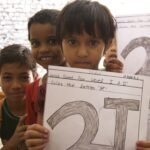
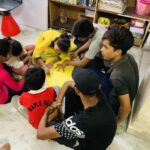
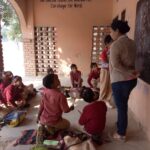
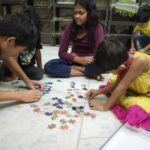
2. Enabling parents
A core aspect of our work is conversations with the parents on impact of physical and mental violence on children. We normally enter a community through Street Plays based on “theatre of the oppressed”. As per NCPCR Guidelines on Corporal Punishment, School Management Committees (SMCs) have a crucial role to play. Therefore, we make the parents aware and facilitate them to ensure proper functioning of the SMCs. Our Parent Curriculum focusses upon capacity building of parents to create a joyful environment for children. They are also trained in handling difficult situations and engaging with teachers for better upbringing of children.
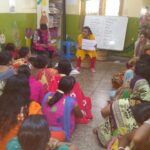
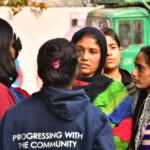
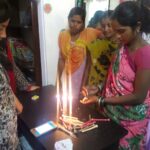
3. Enabling Teachers
We build capacities of teachers to use child-centric and nonviolent methods that encourage students to inculcate discipline on their own. To do this, we conduct regular workshops and follow-ups based on our Teacher Curriculum. The workshops also equip teachers with practical skills to improve classroom management and relationship building with the students. Moreover, our workshop content is adaptable as per context of the school – multi-grade multi-level teaching, cultural sensitivities and pupil-teacher ratio. The teachers and school management learn the concept of corporal punishment and develop an action plan that encourages self-regulation among students rather than use of violence.
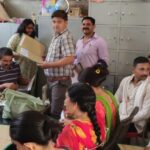
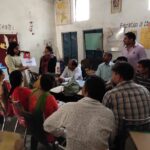
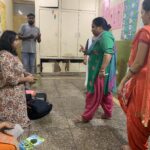
4. Strengthening Government Structures and Advocacy
The guidelines of NCPCR on corporal punishment are largely overlooked. We have been attempting to work on dissemination of the guidelines to relevant stakeholders and ensuring their implementation in government schools. Right to Education Act, 2009 mandates constituting School Management Committees, however most of them are not even aware of their role to establish Corporal Punishment Monitoring Cell (CPMC). We engage with the district administration and SMCs to establish CPMCs and enable them through training and regular on-field support. We are also in the process of critiquing policies and law so that we move towards achieving Target 16.2 of the Sustainable Development Goals (SDG) in India.
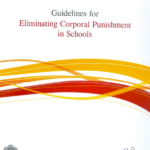
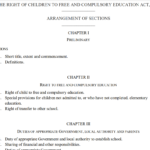
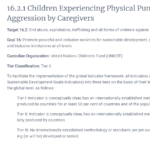
5. Encouraging debates and building a narrative on the issue
Physical and mental violence at schools as well as homes is a grievous problem which is not spoken about in India at all. It does not even come across as an “issue” in common tongue. Rather, punishment of children is considered “favourable” for their education and growth. We are on course to generate conversations and debates on the issue through community meetings and workshops with various social actors as well as using online mediums like blogs, petitions, polls, podcasts and others to reach out to wider audience. Our aim is to bring the narrative out of marginalisation into the mainstream.
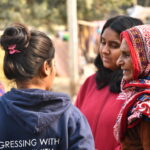
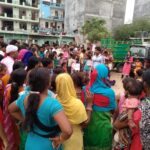
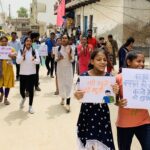
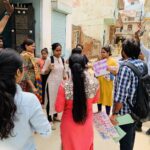
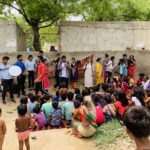
6. Leading body of knowledge in India
As per our research, there are around 15 global/grassroot organisations working on the issue of corporal punishment in India, but they all are largely focusing upon Teachers Training. We have been building curriculum, tools, videos, frameworks and protocols so that the issue can by systemically dealt with. All the knowledge developed by us is under the creative commons license and can thus be used, adapted or shared by those working in India or other countries with similar context. We also partner with child-centric organisations like Pratham and others to co-develop content in various forms.
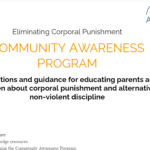
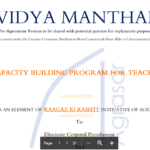
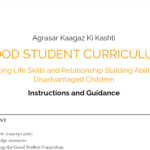
7. Handling Cases related to physical as well as mental violence against children all across India
Even though we aim to completely stop corporal punishment, we need time before we achieve the desired stage as the problem is complex and not well understood. We deal with individual cases of physical and mental harassment through our helpline – 1800-121212-0. Also, we are in the process of empaneling counsellors in every district of India so that a swift action can be taken against varied complaints of corporal punishment. The Research Cell has developed a comprehensive case handling protocol that clearly defines roles of the facilitator and guides/ counsellors. Lawyers have also been empaneled at state level if the case goes to litigation. The cell has also developed a comprehensive law framework for quick reference by the lawyers at Agrasar. This framework can also be used by other organisations working on the issue.
Impact of our work
Impact Assessment Study is planned to be carried out in 30 September 2024.
Parental Corporal Punishment in migrant dominated communities in Gurugram | DCPCR, 2022
Agrasar’s article based on our research on “Parental Corporal Punishment in migrant dominated communities in Gurugram during Covid 19 lockdown” got published in ‘Children First’ journal published by Delhi Commission for Protection of Child Rights (DCPC)R. The journal was launched by Shri Manish Sisodia, Dy. Chief Minister of Delhi, on 06 August 2022. Through this research we tried to understand the impact of covid 19 lockdown on corporal punishment in home settings.
Our article is published on Page No. 119 of the journal.
Blogs on Corporal Punishment in India and around the world
Without profound change in society our schools will never be safe
Following the killing of seven-year old Pradyuman at a private School in early September[1] last year and the public outcry,
Corporal punishment destroys our well being
Corporal punishment is the “lowest”-intensity form of child abuse that builds the foundation for large-scale and severe violence that afflicts
Corporal punishment is part of India’s “learning crisis”
Bill Gates recently said that his biggest disappointment in India was its education sector. He added though that he was
National and Global References to Agrasar's Work
Global Education Monitoring Report 2019 | UNESCO
International Journal of Educational Development, March 2022
Education Desk | Indian Express
Gurushala | Pratham Education Foundation
Bhavdeep Kang | The Free Press Journal
Gurugram News | Hindustan Times
Prerit Rana | The Logical Indian
Guest Feature | Global Partnership to End Violence Against Children
Newsfeed | Corporal Punishment
-
Ireland’s Journey: “Why didn’t we do this years ago?”
Source: Global Initiative to End All Corporal Punishment of Children Published on 2024-07-11
-
A critical year to #EndCorporalPunishment: 2024 blog series
Source: Global Initiative to End All Corporal Punishment of Children Published on 2024-07-11
-
Review of states committed to prohibition of corporal punishment in all settings – Czech Republic and Switzerland added to list of committed states
Source: Global Initiative to End All Corporal Punishment of Children Published on 2024-06-12
-
Save the Children’s work towards ending corporal punishment of children
Source: Global Initiative to End All Corporal Punishment of Children Published on 2024-06-10
-
UN Committee on the Rights of Child issues recommendations to Bhutan, Egypt, Estonia, Georgia, Guatemala, Mali, Namibia and Paraguay
Source: Global Initiative to End All Corporal Punishment of Children Published on 2024-06-08

